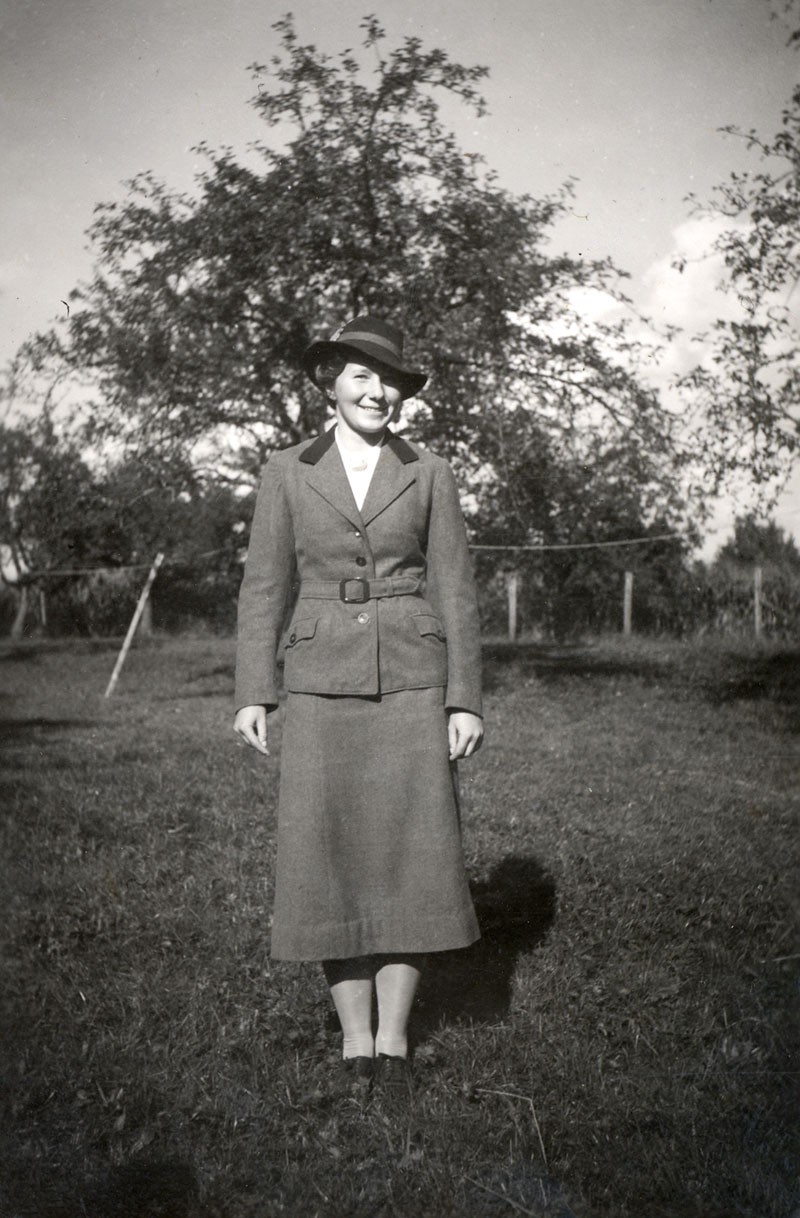Remebered and Retold - Life Story of the Otto Family
Chapter 29
Helping the Farmers
Our labor camp was on the high plateau east of Stuttgart, renowned for its rough climate. We helpers lived on the top floor of the schoolhouse, 25 crammed into four rooms in double-decker bunk beds. Our camp was being built outside the village.. Girls from all walks of life assembled in April to help the farmers in their daily chores with hay and wheat harvest. The work supervisors handed out simple blue dresses and for Sundays and furloughs a gray uniform with a white blouse and a hat. Every morning at seven-thirty we walked to the assigned farmer and returned to the camp after five to have supper, which consisted mostly of sandwiches and a bowl of soup. The farmer was supposed to give us a noon meal. Cleaning the pig stalls and cow barns was considered the worst assignment, but standing over a big tub and rubbing the extremely dirty laundry on a washboard proved even more hated. Many knuckles were raw and red in the evening.
In May the harvesting of the grass began and every hand was needed to bring the dried hay into the barn before the next rain or storm hit. In a row of 10 or more we had to rake and turn over the grass with heavy wooden rakes. The farmers placed us in the middle of the row to make sure we kept pace. We were not used to working so hard and our shoulders started to ache. The farmer's wife brought the lunch to the fields in order to save time. A big jug of homemade apple wine, slices of dark bread and hunks of cheese were the normal fare. The jug made the round but we quickly learned to bring our own cups. The apple wine took its toll. We could not move quickly enough for the farmer after the lunch break.

Irmgard in Labor Service Uniform 1938
"Please, could we rather have water?" I begged. The farm hands laughed: "These city girls are wimps," they said. But they knew that it was to their own advantage not to give us the wine.
Two of our girls were working for the poorest family in the area. They already had seven children and were expecting the eighth. The farmer's wife made all the shortcuts she knew to save on work and money. For lunch a kettle was put in the middle of the bare wooden table in the kitchen, everybody got a spoon and had to fend for himself. Even pregnant, the wife worked as hard as ever. Since she wore loose clothes, nobody knew how far along she was. One morning the girls came and expected the farmer as usual to delegate the work to them, as the farmer's wife was washing clothes in the sink.
"You can continue to wash," she told them, wiping her hands. "I have to feed the kids. My husband is sleeping in; he had a rough night. He had to deliver the baby!" Then they heard faint cries of the baby upstairs. When the farmer appeared later, the girls did not know if they should congratulate him or express sympathy that he had to raise another child. He was unperturbed:
"No problem," he said "The kid just gets a spoon in his hand and digs in with the rest. And later I have another hand for the work in the fields." The wife's face showed concern and worry; the extra burdens were always on her.
The big event of our work on the farm was the visit of several regional leaders of the work corps. They wanted to see the progress of the new camp. We did not help at the building site but had started to sew curtains, make pillows and lamps. I was encouraged to make drawings for built-in furniture, choose colors and make signs. It gave me a chance to avoid the strenuous harvest. They came on a Sunday so that we would not miss a workday. Some new songs were rehearsed and we expected a better than usual meal. As they were leaving, the highest ranking leader took me aside, saying, "Would you like to stay in this service? We would train you for leadership, maybe even give you an education in interior design so you can help with the many new camps we intend to build." I was stunned. Would they take no for an answer? "That's an honor," I stammered, "but I have to talk it over with my relatives. I might be needed at home." It would be easier to give my "regrets" later to my camp leader.
© Irmgard
& Jürgen Otto 1993 All
rights resevered
Zuletzt geändert: 04.08.2024 13:58:43